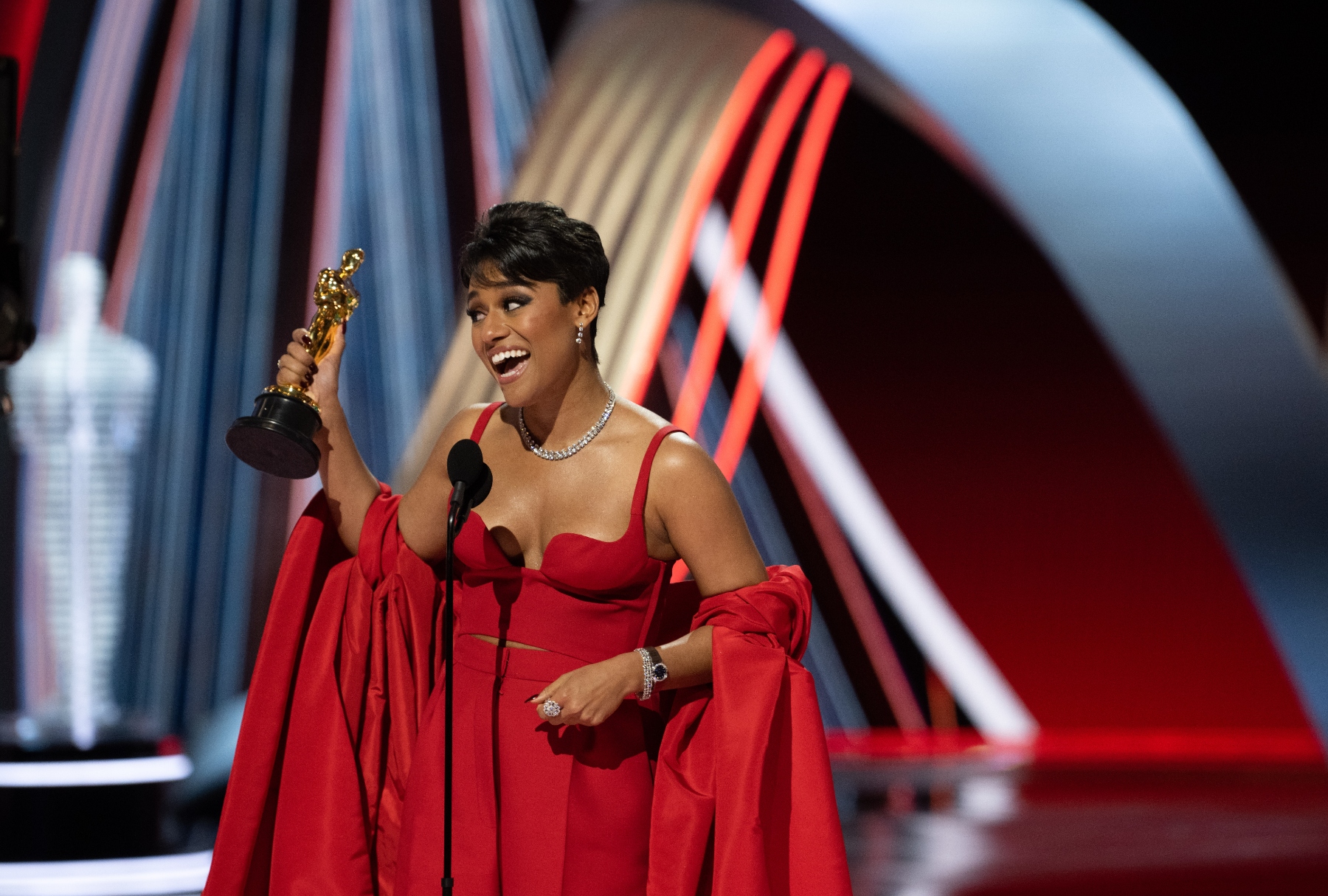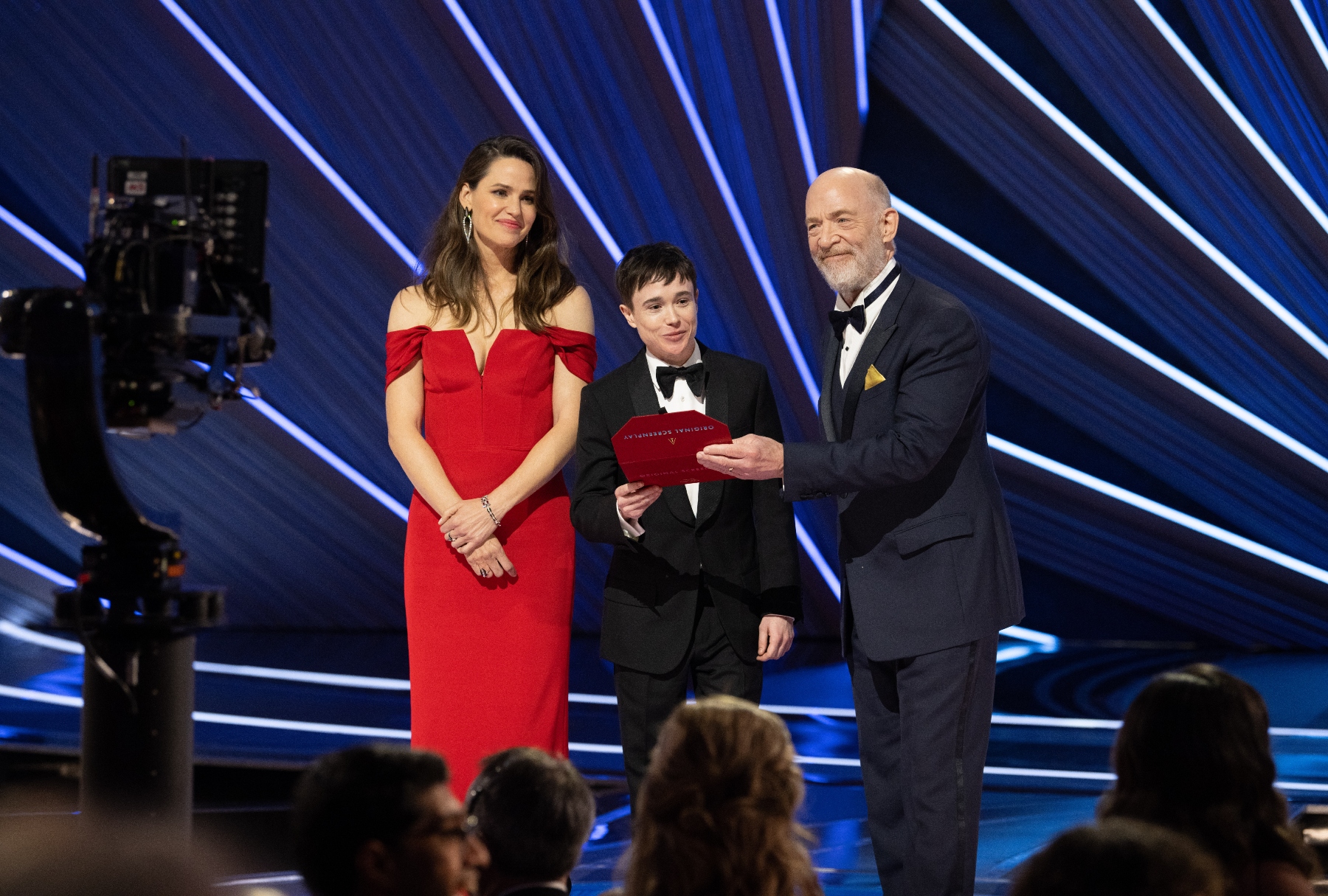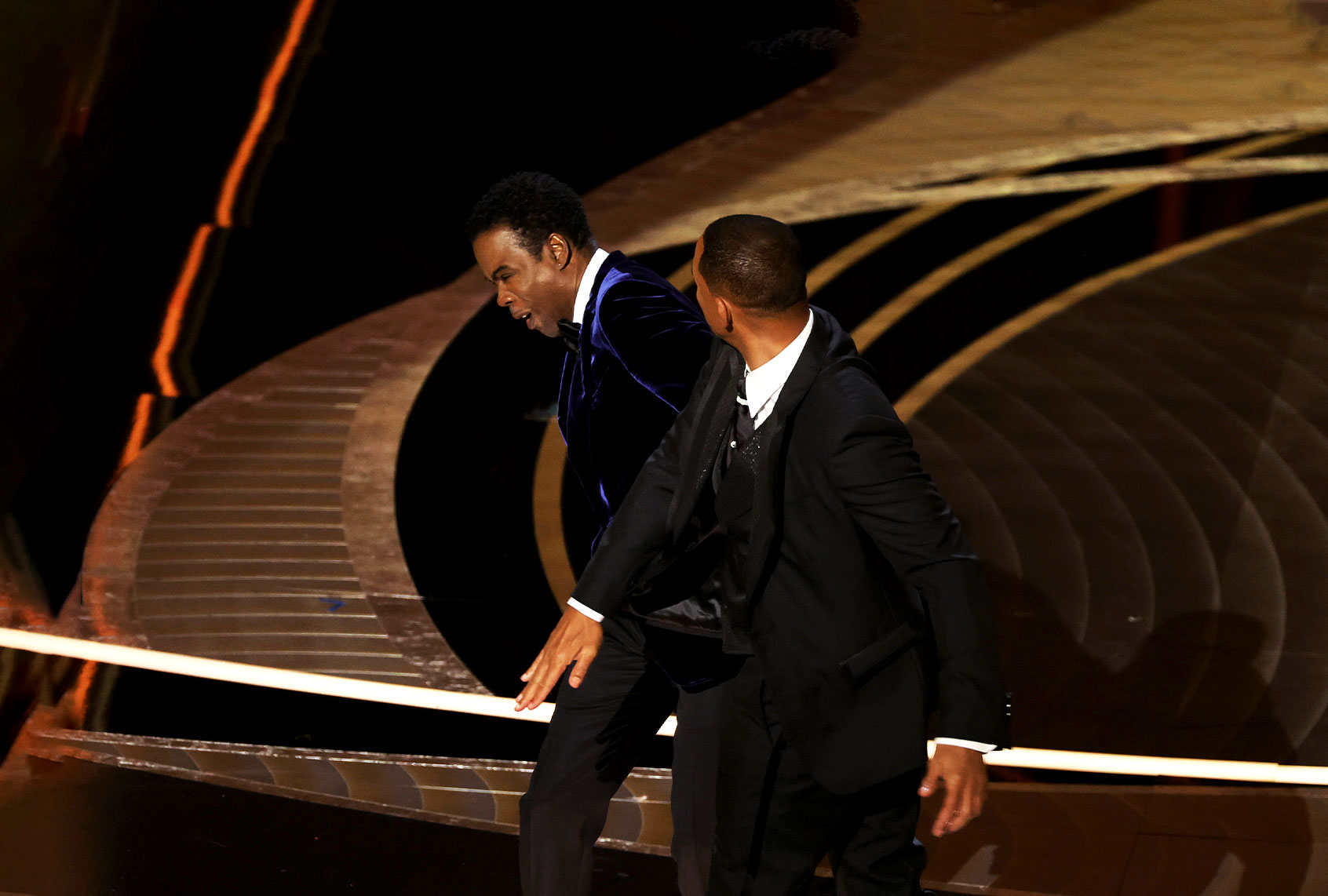People talk a lot about refusing to let others steal our joy — Black folks especially. The originator of that term may be lost in time and a sea of memes, but during Sunday night’s Oscar telecast, the concept came to mind as I processed the sight of Will Smith striding onstage at Hollywood’s Dolby Theatre to slap Chris Rock.
While presenting the award for best documentary feature, Rock cracked jokes about Jada Pinkett Smith’s baldness. What he may not have known is that Pinkett Smith has openly discussed living with alopecia, an autoimmune condition that causes rapid hair loss. For the record, Rock’s jokes weren’t creative or fresh; the punchline referenced “G.I. Jane,” a 1997 movie that’s faded from popular memory. Millions of slack-jawed people around the world won’t soon forget about this, though.
ABC quickly muted the live feed, leaving an audio-free passage during which viewers tried to read Smith’s lips as he angrily yelled at Rock. (He screamed “keep my wife’s name out of your f**king mouth!” twice.) Soon the comedian regained his composure and completed the job for which he was hired: presenting the Oscar for best documentary feature to the wonderful “Summer of Soul (… Or, When the Revolution Could Not Be Televised),” produced and directed by Ahmir “Questlove” Thompson.
 Questlove accepts for best documentary for “Summer of Soul” at the Oscars – 94th Academy Awards on March 27, 2022 (Blaine Ohigashi / A.M.P.A.S.)
Questlove accepts for best documentary for “Summer of Soul” at the Oscars – 94th Academy Awards on March 27, 2022 (Blaine Ohigashi / A.M.P.A.S.)
Thompson took the stage with the viewing audience still reeling. After all, one of the most multi-generationally appealing Black actors of our time, and one favored to win the best actor statue that night, had just assaulted Rock, whose famous joke about O.J. Simpson came back to haunt him. (“I’m not saying Smith shoulda slapped him … but I understand!”)
It happened while Rock was in the process of awarding an Oscar to another Black artist, one who unearthed a piece of music history that might otherwise have been lost to the ages. “This is such a stunning moment for me right now,” Thompson said as he choked back tears while accepting the award. “But this is not about me. This is about marginalized people in Harlem that needed to heal from pain.”
How many people were in a headspace to appreciate those words, I wonder — either then, or when Smith went on to win Best Actor for his starring role in “King Richard”?
Hopefully The Slap did not steal Questlove’s joy. But it robbed some from the 94th Academy Awards’ audience.
Hopefully The Slap did not steal Questlove’s joy. But it robbed some from the 94th Academy Awards’ audience. It also took away from an honor that partly belongs to Venus and Serena Williams, the women who entrusted Smith to honor their father through his performance.
“Art imitates life,” Smith said in his acceptance speech, where he apologized to the Academy of Motion Picture Arts and Sciences, but not to Rock. “I look like the crazy father, just like they said about Richard Williams. But love will make you do crazy things.”
Like, say, besmirching an evening that featured Black women making Oscars history, with Regina Hall and Wanda Sykes joining Amy Schumer as the first trio of women to host the show.
It also stole a piece of the limelight from the history made by “CODA” and its star Troy Kotsur winning the top prize and best supporting actor, the first time a deaf performer has won in this category and the second deaf actor to win overall. The Oscar for “CODA” also makes Apple TV+ the first streaming to produce a best picture.
Seeing Kotsur’s soulful response to receiving his Oscar was rewarding, as was Ariana DeBose’s for best supporting actress, earned for her portrayal of Anita in “West Side Story.” DeBose’s triumph represents the first time an openly queer woman of color has won an Oscar. She’s also the third Latinx actress to win in the category, following in the footsteps of Rita Moreno (who also won for her Anita in the 1961 film adaptation) and Mercedes Ruehl.
 Ariana DeBose accepts for best supporting actress at the Oscars – 94th Academy Awards on March 27, 2022 (Blaine Ohigashi / A.M.P.A.S.)
Ariana DeBose accepts for best supporting actress at the Oscars – 94th Academy Awards on March 27, 2022 (Blaine Ohigashi / A.M.P.A.S.)
These are a few of the ways the Oscars inspired on Sunday, and it is vital to remember them. Even with its flaws — and there were others aside from the Smith-Rock explosion — it was helmed by two Black producers, Will Packer and Shayla Cowan. That’s also one for the books.
Nevertheless, Packer and Cowan went into this show with a mess on their hands, dealing with the blowback for cutting eight categories from the televised event only to go over the prescribed three hours by around 40 minutes.
Smith’s assault only worsened matters — and made him look worse. When the world is watching and the top acting Oscar is in your grasp, a death glare would have sufficed, right? Reporters are waiting backstage to write down everything he has to say, on top of what he could have included in an acceptance speech that wasn’t dedicated to re-branding his outrage as protectiveness.
The Academy assured the public via Twitter that it “does not condone violence of any form,” adding in the same post, “Tonight we are delighted to celebrate our 94th Academy Awards winners, who deserve this moment of recognition from their peers and movie lovers around the world.”
The awards body did nothing to respond to Smith in the moment besides muting the confrontation and editing the actual slap. In fact, the camera made a meal out of it by showing him yelling at Rock.
By that point the production was already wobbling off its axis. Having three hosts meant making room for three comedy bits that ranged from typical awards-opening stand-up (by Schumer) to a horny bit involving Hall feeling up Josh Brolin and Jason Momoa.
That was nearly as unnecessary as the off-key, interactive In Memoriam segment.
Hall was lampooning behavior men in Hollywood have gotten away with for eons, and she’s a sharp comic actor. Then again, it’s still pretty icky. We also could have done without Sykes’ wander through the Academy Museum of Motion Pictures, which looks like a cross between a sci-fi biodome, a Madame Tussauds exhibit and a Best Buy. That was nearly as unnecessary as the off-key, interactive In Memoriam segment.
Still, the production took pains to counteract the #OscarsSoWhite accusation by foregrounding performers of color, opening with the Williams sisters introducing Beyoncé. Queen Bey beamed in from the Compton tennis courts where Venus and Serena got their start, flanked by an immaculately choreographed battalion of chartreuse-clad dancers and musicians. Between the tennis ball-colored court and the costumes, everyone literally glowed.
The second showstopper was a technicolor, star-stacked live performance of the breakout hit from Disney’s “Encanto,” “We Don’t Talk About Bruno.” That song was not nominated, but it’s a hit with kids who love the Oscar winner for best animated feature. Between the wall of TikTok frames behind the film’s actors singing and dancing, and a high stepping Megan Thee Stallion rapping a bridge tailored for Oscar night, the number came across like a wonderful miracle.
Of course, all of that transpired pre-smack.
Want a daily wrap-up of all the news and commentary Salon has to offer? Subscribe to our morning newsletter, Crash Course.
Purely from the perspective of what it meant for this production, the main effect of Smith’s interruption was to distract from other parts worth remembering. The Oscars marked the 15th anniversary of “Juno” by inviting its stars Jennifer Garner, J.K. Simmons and Elliot Page to present, elevating trans visibility by celebrating great work by a transgender performer.
 Jennifer Garner, Elliot Page, J.K. Simmons present the Oscar for best screenplay at the 94th Academy Awards on March 27, 2022 (Blaine Ohigashi / A.M.P.A.S.)
Jennifer Garner, Elliot Page, J.K. Simmons present the Oscar for best screenplay at the 94th Academy Awards on March 27, 2022 (Blaine Ohigashi / A.M.P.A.S.)
Best actress winner Jessica Chastain (“The Eyes of Tammy Faye”) used her moment to directly call out the anti-LGBTQIA bills circulating in states throughout the country: “We’re faced with discriminatory and bigoted legislation that is sweeping our country with the only goal of further dividing us. There’s violence and hate crimes being perpetuated on innocent civilians all over the world,” she said.
RELATED: “The Eyes of Tammy Faye” helped me reconsider my painful Evangelical childhood
Surprisingly, statements supporting Ukraine were relatively muted. Aside from a tasteful moment of silence, the war in Ukraine was referred to in the broadest of terms until Francis Ford Coppola, Robert DeNiro and Al Pacino took the stage to mark the 50th anniversary of “The Godfather.”
Packer, Cowan and the Academy are likely to answer some hard questions about why the show ran so long — along with, perhaps, having to explain why the 60th anniversary of the James Bond franchise was introduced by athletes Tony Hawk, Shaun White and (a very orange) Kelly Slater.
That wasn’t much better than DJ D-Nice’s pop music choices for the presenters — Daniel Kaluuya took the stage to strains from Toto’s “Africa” and Stephanie Beatriz entered to “La Isla Bonita.” He also played Earth, Wind & Fire’s “Fantasy” in connection with at least one of the many wins for “Dune,” but you understand the difference, right? “Fantasy” is simply a corny choice. The others are tasteless. (Toto? As walk-on music for the man who won an Oscar playing Black Panther leader Fred Hampton? Really?)These are less important than the conversations that should happen regarding the lack of visible ASL interpreters on a telecast featuring a hearing-impaired film nominated in many categories. Woe to you if you were hoping for a captioned translation for that performance of “Dos Oruguitas.” All that was offered was something along the lines of “sings in foreign language.”
Making a person’s physical appearance the butt of a joke is vulgar apart from any medical condition responsible for said appearance. Assaulting the person making that joke represents an entirely different level of error.
The coming days are sure to be loaded with takes — shaming or in defense of both Smith and Rock. Both are at fault in my book. Making a person’s physical appearance the butt of a joke is vulgar apart from any medical condition responsible for said appearance. Assaulting the person making that joke represents an entirely different level of error. This isn’t simply about the impropriety of it, but the signal it sends to others who may see violence as an acceptable and even chivalrous response to statements that offend them.
Smith framed it as such, following a commercial break where he was comforted by fellow Oscar nominee Denzel Washington and his personal publicist. Remember, in addition to winning an Oscar, Smith also produces a popular drama for one streaming service (Peacock’s “Bel-Air”) and toplines a NatGeo nature series for another (“Pole to Pole” on Disney+). He has much to lose in the short term.
Thus, through tears, he opened his acceptance speech with, “Richard Williams was a fierce defender of his family. In this time in my life, in this moment, I am overwhelmed by what God is calling on me to do and be in this world.”
Smith then went on to refer to his “King Richard” co-stars as women he needed to protect, saying he was called upon “to be a river to my people” and wanting to be “a vessel for love.” The world is constantly being reminded that Black women need protecting, a message that is frequently disregarded by people like Rock. Intensifying this sting is the fact that Rock produced a documentary about Black hair and the societal pressure placed on women to maintain it.
But using a Black woman’s pain as an excuse for enacting violence against another person in any situation, let alone at the Oscars, is dishonest. Smith’s actions do nothing to protect the Williams family, his wife, his co-stars or other Black women. But they will require people to have to purposefully remember DeBose testifying about finding “her strength and life through art” as an Afro Latina, or Questlove wishing that his beautiful mother and dad had been able to take him to the Harlem Cultural Festival. For those of us in the business of preserving our joy, the extra effort it takes to keep those moments alive is worthwhile. It’s still work.
More stories on these films and artists:

